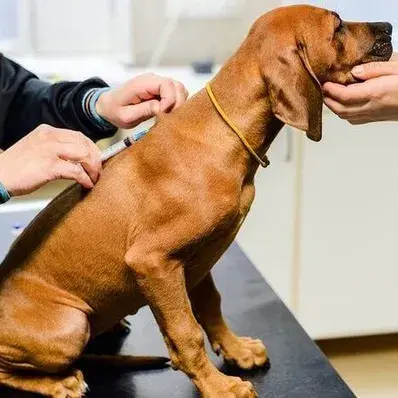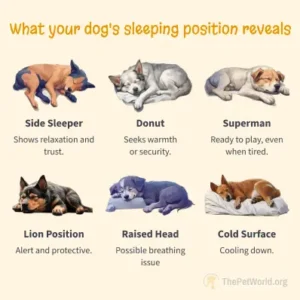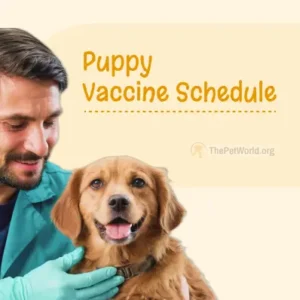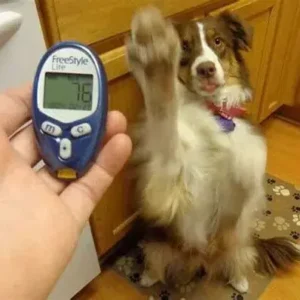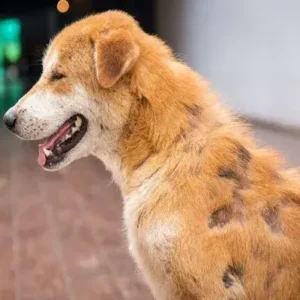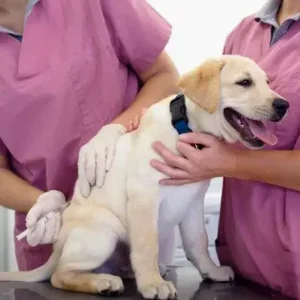What Causes Parvovirus in Dogs?
The primary cause of parvovirus in dogs is the virus itself, which spreads through the feces of infected dogs. When infected dogs shed the virus in their stool, it contaminates surfaces, environments, and other dogs.
The virus is highly resilient and able to survive in the environment for months, making it easy for other dogs to become exposed. Once the virus enters a dog’s body, it begins to attack rapidly dividing cells, primarily in the intestines.
Symptoms of Parvovirus in Dogs
The symptoms typically appear within 3-7 days after infection. Early signs often include:
- Vomiting
- Severe diarrhea (often bloody)
- Loss of appetite
- Lethargy
- Fever
As the disease progresses, the symptoms can worsen, leading to severe dehydration, shock, and even death. Recognizing these parvovirus symptoms early is crucial to starting treatment and increasing the chances of recovery.
How Long Does the Parvovirus Last?
Parvo can last 5 to 10 days in an infected dog, depending on the infection’s severity. However, the virus can remain dormant in the environment, like in soil, for up to a year. Recovery requires supportive care, and it may take the dog an additional 2 to 3 weeks to fully regain strength.
Stages of Parvovirus in Dogs
The stages of canine parvovirus follow the typical viral infection pattern:
Infection
A dog becomes exposed to parvovirus through contact with fecal material from an infected dog. Even without visible feces, exposure can occur through the environment or objects that have been contaminated by an infected dog.
Incubation
The incubation period usually lasts 3 to 7 days, when the dog is infected but not yet showing symptoms. During this phase, the virus targets rapidly dividing cells, starting with the tonsils or lymph nodes in the throat.
Once the virus enters the bloodstream, it targets rapidly dividing cells, mainly affecting the:
- Bone marrow
- Cells lining the small intestine
- In very young puppies, the virus can also damage the heart, causing inflammation, reduced heart function, and arrhythmias.
Illness
When the virus attacks the bone marrow, it reduces the number of protective white blood cells, weakening the immune system. This makes it easier for the virus to invade the gastrointestinal (GI) tract.
The virus causes severe damage by destroying the intestinal lining, which impairs the GI tract’s ability to:
- Absorb nutrients
- Retain fluid, leading to dehydration
- Prevent bacteria from entering the bloodstream
Diagnosing Parvovirus in Dogs
If you suspect your dog has parvovirus, the vet will perform a test for parvovirus in dogs. This typically involves a fecal test that detects the virus’s genetic material. Blood tests may also be conducted to assess the extent of dehydration and overall health.
Since early detection is vital to begin treatment, it significantly impacts the survival rate. The virus attacks the gastrointestinal system and bone marrow. Timely supportive care is essential for recovery. It significantly increases your dog’s chances of survival.
Treatment of Parvovirus in Dogs
Once diagnosed, treatment focuses on managing the clinical signs and supporting the dog’s recovery.
- Manage clinical signs: Focus on controlling symptoms like dehydration, vomiting, and diarrhea.
- No antiviral cure: Treatment supports recovery as there is no specific medication to kill the virus.
- IV fluids: Replenish fluids lost due to severe vomiting and diarrhea.
- Electrolytes and medications: Restore mineral balance and control vomiting/diarrhea.
- Antibiotics: Prevent secondary bacterial infections caused by intestinal damage.
- Vaccination: Keep up with vaccinations and boosters to reduce the risk of infection.
Can Parvovirus in Dogs Be Treated at Home?
Parvovirus requires professional care, especially for severe cases. Home remedies for parvovirus in dogs are not proven to be effective and can delay proper medical intervention. Always consult a veterinarian for guidance on treatment.
Susceptible Breeds to Parvovirus:
To help prevent serious health issues like parvovirus, it’s essential to be aware of the dog breeds most at risk.
- Schapendoes
- Cairn Terrier
- Collie
- Rottweiler
- Doberman Pinscher
- Pit Bull Terrier
- Chihuahua
- German Shepherd
These breeds, particularly puppies, may be more vulnerable to parvovirus, which highlights the importance of early vaccinations and preventive care.
Vaccine of Parvovirus
Vaccination is the most effective way to prevent parvovirus in dogs. The parvovirus vaccine is part of the core vaccinations that puppies should receive starting at 6-8 weeks of age, followed by boosters. For a full vaccination plan, refer to your puppy vaccine schedule, and ensure that adult dogs continue regular vaccinations to maintain protection.
Parvovirus in Dogs Treatment Cost
The cost of treating parvovirus in dogs can be high due to the need for intensive care, including IV fluids, medications, and hospitalization. Treatment costs vary depending on the severity of the infection and the duration of care. On average, the total cost for parvovirus treatment can range from $1,000 to $5,000, depending on the clinic and the dog’s condition.

